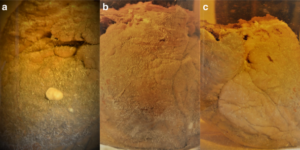Research on the heart of Fryderyk Chopin, conducted with the participation of scientists from the Institute of Human Genetics, PAS, confirmed with a probability bordering on certainty that the cause of the composer’s death was long-term disseminated pulmonary tuberculosis.
 Even from Wikipedia we can find out that the cause of death of the greatest Polish composer – Fryderyk Chopin, was tuberculosis, but scientists put forward various theories about what he suffered from and what was the cause of his death. There were many premises that the composer could potentially suffer, for example, from cystic fibrosis.
Even from Wikipedia we can find out that the cause of death of the greatest Polish composer – Fryderyk Chopin, was tuberculosis, but scientists put forward various theories about what he suffered from and what was the cause of his death. There were many premises that the composer could potentially suffer, for example, from cystic fibrosis.
With my own eyes …
Only a thorough macroscopic analysis of Chopin’s heart, located in the crypt of the Church of St. Cross in Warsaw, made with the participation of, inter alia, prof. Michał Witt from the IHG PAS allowed us to conclude (with probability bordering with certainty) that the main disease with which Fryderyk Chopin suffered was long-term disseminated pulmonary tuberculosis. It caused the progressive deterioration of the composer’s general physical condition and many different symptoms, mainly from the respiratory tract. Tuberculous pericarditis, rapidly progressing in the last period of his life, most likely was the direct cause of the composer’s death, leading to cardio-respiratory failure.
 The morphological data obtained in the study, described in such detail for the first time, and the data from the natural history of the composer’s illness indicate with high probability that in the last period of his life, Fryderyk Chopin suffered from severe fibrinous pericarditis. This is evidenced by fibrinous deposits on the surface of the heart, foci of enamel, focal bloody ecchymoses on the anterior wall of the left ventricle, dilatation of mainly the right ventricle and possibly the right atrium, with clear features of right ventricular chronic heart failure.
The morphological data obtained in the study, described in such detail for the first time, and the data from the natural history of the composer’s illness indicate with high probability that in the last period of his life, Fryderyk Chopin suffered from severe fibrinous pericarditis. This is evidenced by fibrinous deposits on the surface of the heart, foci of enamel, focal bloody ecchymoses on the anterior wall of the left ventricle, dilatation of mainly the right ventricle and possibly the right atrium, with clear features of right ventricular chronic heart failure.





